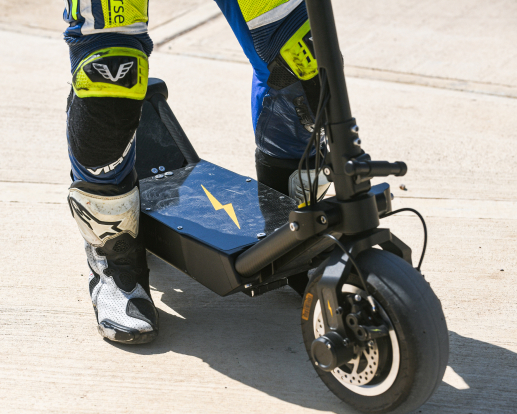
When choosing an electric scooter, one critical detail to consider is whether it comes equipped with a controller. It plays a significant role in managing the scooter’s power supply, speed, acceleration, and overall performance. Comparing electric scooters with controllers to those without can help you make an informed decision based on your needs and preferences.
– Advantage: Scooters with controllers offer precise control over speed and acceleration, making them safer and more manageable, especially for beginners or in congested urban areas.
– Storage: If you’re not using your scooter for extended periods, store the battery at a 50% charge level in a cool, dry place.
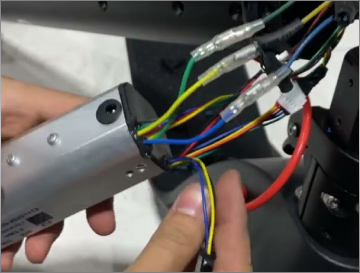
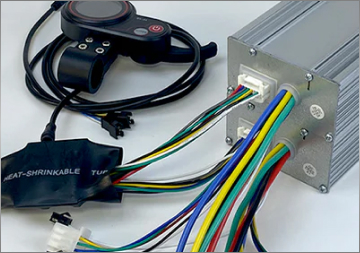
Advantage: Controllers regulate power use effectively, improving efficiency and potentially extending the battery’s life and the scooter’s range.
Consideration: The added complexity of a controller system can add to the initial cost of the scooter.
Advantage: Advanced controllers allow for customization, such as setting speed limits or acceleration curves, adjusting for a more personalized riding experience.
Consideration: The more complex the controller, the more potential maintenance or troubleshooting it might need.
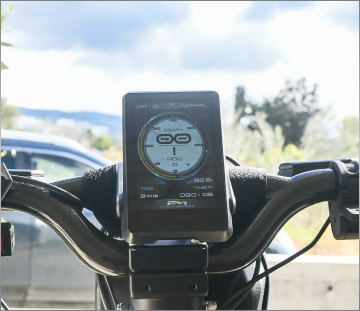
Scooters without controllers are simpler, providing direct power from the battery to the motor without modulation. Here are their benefits and considerations:
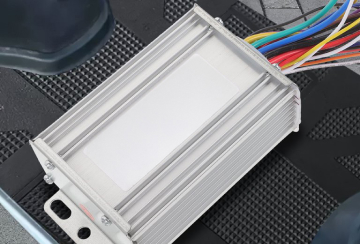
Advantage: No controller means a simpler and often cheaper scooter, appealing for those on a budget or who prefer minimal tech.
Consideration: The lack of complexity reduces the initial purchase price but can limit performance and user experience.
The battery is the heart of your electric scooter, and proper care is Advantage: Fewer electronic components can mean fewer parts that might need repair or replacement, potentially lowering maintenance efforts and costs.crucial:
Consideration: The direct power approach can lead to faster wear on the battery and motor due to unregulated current flow.
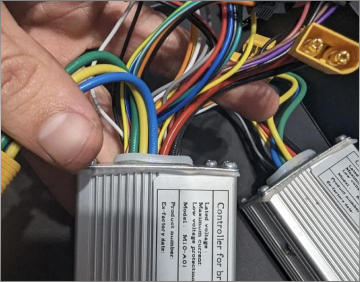

Advantage: Some riders prefer the unfiltered connection between the throttle and the motor, equating it to the feeling of riding a traditional gas-powered scooter.
Consideration: Without a controller, riders sacrifice the ability to fine-tune their ride for comfort, efficiency, or safety, which might not suit everyone’s preferences.
he comparison between electric scooters with and without controllers boils down to a trade-off between complexity and control versus simplicity and ruggedness.
Scooters with controllers offer precision, efficiency, and customization at the trade-off of higher costs and potentially more maintenance. They are suited for riders who value performance and personalization in their commuting or recreational experience.
Scooters without controllers, on the other hand, appeal to those who prefer simplicity, lower costs, and perhaps a more “raw” riding sensation, willing to forgo advanced features and optimal power management.
Ultimately, the right choice depends on your specific needs, budget, and riding style. Understanding the role of controllers in electric scooters can guide you toward a model that aligns with your preferences, ensuring a satisfying and efficient riding experience.
This is a very dynamic era of electrification, and performance and...
Introduction: Understanding the Debate The urban mobility landscape has been completely...
The transition to electric mobility is a revolution where phase speed...

72 Volts 30 Ah (2016Wh charge)
Equipped with a long-lasting battery for extended rides and adventures

Dual 3000W BLDC Hub Motors
Powerful dual-engine setup delivers dynamic performance for performance seekers

6 hours fast charging so you can spend less time waiting and more time exploring

110 km/h
Top-tier speed capabilities for the rush of wind and the thrill of pace

100 km
Ready for long journeys with a generous range that keeps you moving

120 kg
Robust build accommodates significant weight, ensuring a ride for all

Disk brake with dual 8 pistons (Front and Rear), E-Brake Included

PMT Italian Slick & Stradale 11-inch tubeless
High-quality tires designed for optimal traction and control in various conditions.

1230 mm
Streamlined design ensures a compact footprint for agile urban navigation.

1290 mm
Elevated stance provides a commanding view of the road ahead.

266 mm
Narrow build offers convenient maneuverability through tight spaces.

540 mm
Quick-fold mechanism reduces the scooter to a compact form for easy storage and portability.

Carbon fiber and CNC 6061 aluminum

IPX67-rated components

Optimized for minimal air resistance

Enjoy peace of mind with a comprehensive warranty covering your scooter

Complete with essential accessories, get everything you need to hit the road immediately

Two 150 AMP Nano Elite X5K
Precision control at your fingertips with advanced, customizable settings."

Choose from classic color options to match your style

72 Volts 30 Ah (2016Wh charge)
Equipped with a long-lasting battery for extended rides and adventures

Dual 3000W BLDC Hub Motors
Powerful dual-engine setup delivers dynamic performance for performance seekers

6 hours fast charging so you can spend less time waiting and more time exploring

110 km/h
Top-tier speed capabilities for the rush of wind and the thrill of pace

100 km
Ready for long journeys with a generous range that keeps you moving

120 kg
Robust build accommodates significant weight, ensuring a ride for all

Disk brake with dual 8 pistons (Front and Rear), E-Brake Included

PMT Slick Italian 11-inch
High-quality tires designed for optimal traction and control in various conditions.

1230 mm
Streamlined design ensures a compact footprint for agile urban navigation.

1290 mm
Elevated stance provides a commanding view of the road ahead.

266 mm
Narrow build offers convenient maneuverability through tight spaces.

540 mm
Quick-fold mechanism reduces the scooter to a compact form for easy storage and portability.

Carbon fiber and CNC 6061 aluminum

IPX67-rated components

Optimized for minimal air resistance

Enjoy peace of mind with a comprehensive warranty covering your scooter

Two 150 AMP Nano Elite X5K
Precision control at your fingertips with advanced, customizable settings."

Choose from classic color options to match your style

60 Volts 30 Ah (2016Wh charge)
Equipped with a long-lasting battery for extended rides and adventures

Dual 3000W BLDC Hub Motors
Powerful dual-engine setup delivers dynamic performance for performance seekers

6 hours fast charging so you can spend less time waiting and more time exploring

110 km/h
Top-tier speed capabilities for the rush of wind and the thrill of pace

100 km
Ready for long journeys with a generous range that keeps you moving

120 kg
Robust build accommodates significant weight, ensuring a ride for all

Disk brake with dual 8 pistons (Front and Rear), E-Brake Included

Front and Rear Single Absorbers
Smooth rides guaranteed with a suspension system that absorbs shocks and jolts

PMT Italian Stradale 11-inch tubeless
High-quality tires designed for optimal traction and control in various conditions.

1170 mm
Streamlined design ensures a compact footprint for agile urban navigation.

1250 mm
Elevated stance provides a commanding view of the road ahead.

241 mm
Narrow build offers convenient maneuverability through tight spaces.

470 mm
Quick-fold mechanism reduces the scooter to a compact form for easy storage and portability.

Carbon fiber and CNC 6061 aluminum

IPX67-rated components

Optimized for minimal air resistance

Enjoy peace of mind with a comprehensive warranty covering your scooter

Complete with essential accessories, get everything you need to hit the road immediately

Safety first with a helmet that combines comfort with protection

Two 150 AMP Nano Elite X5K
Precision control at your fingertips with advanced, customizable settings."

Choose from classic color options to match your style

60 Volts 30 Ah (2016Wh charge)
Equipped with a long-lasting battery for extended rides and adventures

Single 3000W BLDC Hub
Powerful dual-engine setup delivers dynamic performance for performance seekers

6 hours fast charging so you can spend less time waiting and more time exploring

100 km/h
Top-tier speed capabilities for the rush of wind and the thrill of pace

100 km
Ready for long journeys with a generous range that keeps you moving

120 kg
Robust build accommodates significant weight, ensuring a ride for all

Disk brake with dual 8 pistons (Front and Rear), E-Brake Included

Front and Rear Single Absorbers
Smooth rides guaranteed with a suspension system that absorbs shocks and jolts

PMT Italian Stradale 11-inch tubeless
High-quality tires designed for optimal traction and control in various conditions.

1170 mm
Streamlined design ensures a compact footprint for agile urban navigation.

1250 mm
Elevated stance provides a commanding view of the road ahead.

241 mm
Narrow build offers convenient maneuverability through tight spaces.

470 mm
Quick-fold mechanism reduces the scooter to a compact form for easy storage and portability.

Carbon fiber and CNC 6061 aluminum

IPX67-rated components

Optimized for minimal air resistance

Enjoy peace of mind with a comprehensive warranty covering your scooter

One 150 AMP Nano Elite X5K
Precision control at your fingertips with advanced, customizable settings."

Choose from classic color options to match your style
One of our specialists will be in touch within the next 24-48 hours to assist you. We appreciate your interest in our scooters and look forward to speaking with you soon!”

72 Volts 30 Ah (2016Wh charge)
Equipped with a long-lasting battery for extended rides and adventures

Dual 3000W BLDC Hub Motors
Powerful dual-engine setup delivers dynamic performance for performance seekers

6 hours fast charging so you can spend less time waiting and more time exploring

110 km/h
Top-tier speed capabilities for the rush of wind and the thrill of pace

100 km
Ready for long journeys with a generous range that keeps you moving

120 kg
Robust build accommodates significant weight, ensuring a ride for all

Disk brake with dual 8 pistons (Front and Rear), E-Brake Included

PMT Italian Slick & Stradale 11-inch tubeless
High-quality tires designed for optimal traction and control in various conditions.

1230 mm
Streamlined design ensures a compact footprint for agile urban navigation.

1290 mm
Elevated stance provides a commanding view of the road ahead.

266 mm
Narrow build offers convenient maneuverability through tight spaces.

540 mm
Quick-fold mechanism reduces the scooter to a compact form for easy storage and portability.

Carbon fiber and CNC 6061 aluminum

IPX67-rated components

Optimized for minimal air resistance

Enjoy peace of mind with a comprehensive warranty covering your scooter

Complete with essential accessories, get everything you need to hit the road immediately

Two 150 AMP Nano Elite X5K
Precision control at your fingertips with advanced, customizable settings."

Choose from classic color options to match your style

72 Volts 30 Ah (2016Wh charge)
Equipped with a long-lasting battery for extended rides and adventures

Dual 3000W BLDC Hub Motors
Powerful dual-engine setup delivers dynamic performance for performance seekers

6 hours fast charging so you can spend less time waiting and more time exploring

110 km/h
Top-tier speed capabilities for the rush of wind and the thrill of pace

100 km
Ready for long journeys with a generous range that keeps you moving

120 kg
Robust build accommodates significant weight, ensuring a ride for all

Disk brake with dual 8 pistons (Front and Rear), E-Brake Included

PMT Slick Italian 11-inch
High-quality tires designed for optimal traction and control in various conditions.

1230 mm
Streamlined design ensures a compact footprint for agile urban navigation.

1290 mm
Elevated stance provides a commanding view of the road ahead.

266 mm
Narrow build offers convenient maneuverability through tight spaces.

540 mm
Quick-fold mechanism reduces the scooter to a compact form for easy storage and portability.

Carbon fiber and CNC 6061 aluminum

IPX67-rated components

Optimized for minimal air resistance

Enjoy peace of mind with a comprehensive warranty covering your scooter

Two 150 AMP Nano Elite X5K
Precision control at your fingertips with advanced, customizable settings."

Choose from classic color options to match your style

60 Volts 30 Ah (2016Wh charge)
Equipped with a long-lasting battery for extended rides and adventures

Dual 3000W BLDC Hub Motors
Powerful dual-engine setup delivers dynamic performance for performance seekers

6 hours fast charging so you can spend less time waiting and more time exploring

110 km/h
Top-tier speed capabilities for the rush of wind and the thrill of pace

100 km
Ready for long journeys with a generous range that keeps you moving

120 kg
Robust build accommodates significant weight, ensuring a ride for all

Disk brake with dual 8 pistons (Front and Rear), E-Brake Included

Front and Rear Single Absorbers
Smooth rides guaranteed with a suspension system that absorbs shocks and jolts

PMT Italian Stradale 11-inch tubeless
High-quality tires designed for optimal traction and control in various conditions.

1170 mm
Streamlined design ensures a compact footprint for agile urban navigation.

1250 mm
Elevated stance provides a commanding view of the road ahead.

241 mm
Narrow build offers convenient maneuverability through tight spaces.

470 mm
Quick-fold mechanism reduces the scooter to a compact form for easy storage and portability.

Carbon fiber and CNC 6061 aluminum

IPX67-rated components

Optimized for minimal air resistance

Enjoy peace of mind with a comprehensive warranty covering your scooter

Complete with essential accessories, get everything you need to hit the road immediately

Safety first with a helmet that combines comfort with protection

Two 150 AMP Nano Elite X5K
Precision control at your fingertips with advanced, customizable settings."

Choose from classic color options to match your style

60 Volts 30 Ah (2016Wh charge)
Equipped with a long-lasting battery for extended rides and adventures

Single 3000W BLDC Hub
Powerful dual-engine setup delivers dynamic performance for performance seekers

6 hours fast charging so you can spend less time waiting and more time exploring

100 km/h
Top-tier speed capabilities for the rush of wind and the thrill of pace

100 km
Ready for long journeys with a generous range that keeps you moving

120 kg
Robust build accommodates significant weight, ensuring a ride for all

Disk brake with dual 8 pistons (Front and Rear), E-Brake Included

Front and Rear Single Absorbers
Smooth rides guaranteed with a suspension system that absorbs shocks and jolts

PMT Italian Stradale 11-inch tubeless
High-quality tires designed for optimal traction and control in various conditions.

1170 mm
Streamlined design ensures a compact footprint for agile urban navigation.

1250 mm
Elevated stance provides a commanding view of the road ahead.

241 mm
Narrow build offers convenient maneuverability through tight spaces.

470 mm
Quick-fold mechanism reduces the scooter to a compact form for easy storage and portability.

Carbon fiber and CNC 6061 aluminum

IPX67-rated components

Optimized for minimal air resistance

Enjoy peace of mind with a comprehensive warranty covering your scooter

One 150 AMP Nano Elite X5K
Precision control at your fingertips with advanced, customizable settings."

Choose from classic color options to match your style
I, hereby acknowledge that I have read, understood, and agree to be bound by the Terms and Service (“Terms”) outlined by Flashmotors LTD in relation to the purchase and use of their scooters. By accepting these Terms, I affirm that I am of legal age and possess the necessary authority to enter into this agreement.
I specifically acknowledge and agree to the following:
1. Legal Notice: I am aware that the scooters provided by Flashmotors LTD are intended for personal use and must be operated in compliance with all applicable laws and regulations of Cyprus.
2. Withdrawal, Return, Refund, and Cancellation Policy: I understand that as per Cyprus law, I have the right to withdraw from the purchase contract within 14 days of receiving the Product. I agree to follow the specified procedures regarding withdrawal, return, and refund, including returning the Product in its original condition.
4. Complaint Policy: In the event of any issues or concerns with the Product, I agree to promptly contact the customer service team of Flashmotors LTD providing necessary information to assist in resolving the complaint.
5. Liabilities under Cyprus Law: I acknowledge that any liability or obligation arising from these Terms is subject to the laws and regulations of Cyprus. I understand that any dispute related to these Terms shall be subject to the exclusive jurisdiction of the courts of Cyprus.
6. Acceptance of Communication Terms: By providing your contact information and checking the designated boxes during account registration, or by entering your contact details on Flashmotors.com, you expressly consent to receive promotional and informational communications via SMS and email from Flashmotors.
I further acknowledge that Flashmotors LTD reserves the right to modify or update these Terms at any time, with the revised Terms becoming effective immediately upon posting on their website.
By accepting these Terms and Conditions, I confirm that I have reviewed and understood all the provisions contained therein, and I agree to be bound by them in their entirety.